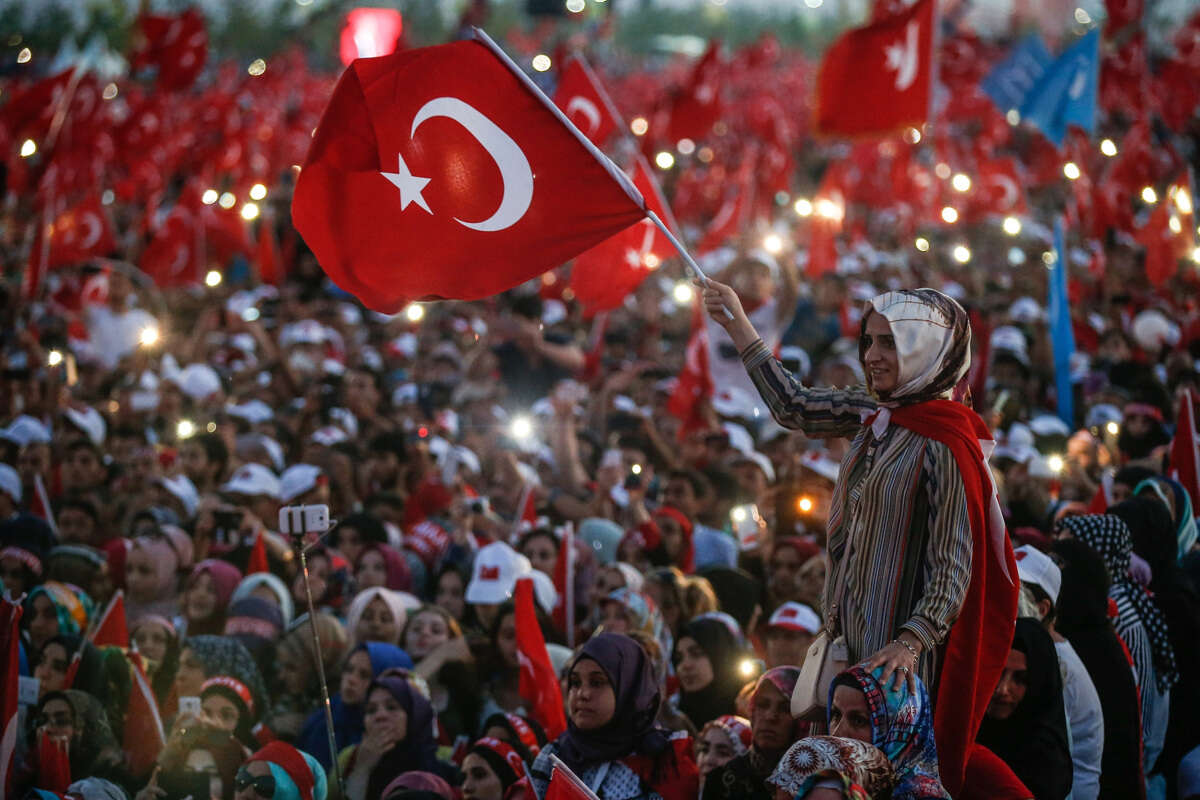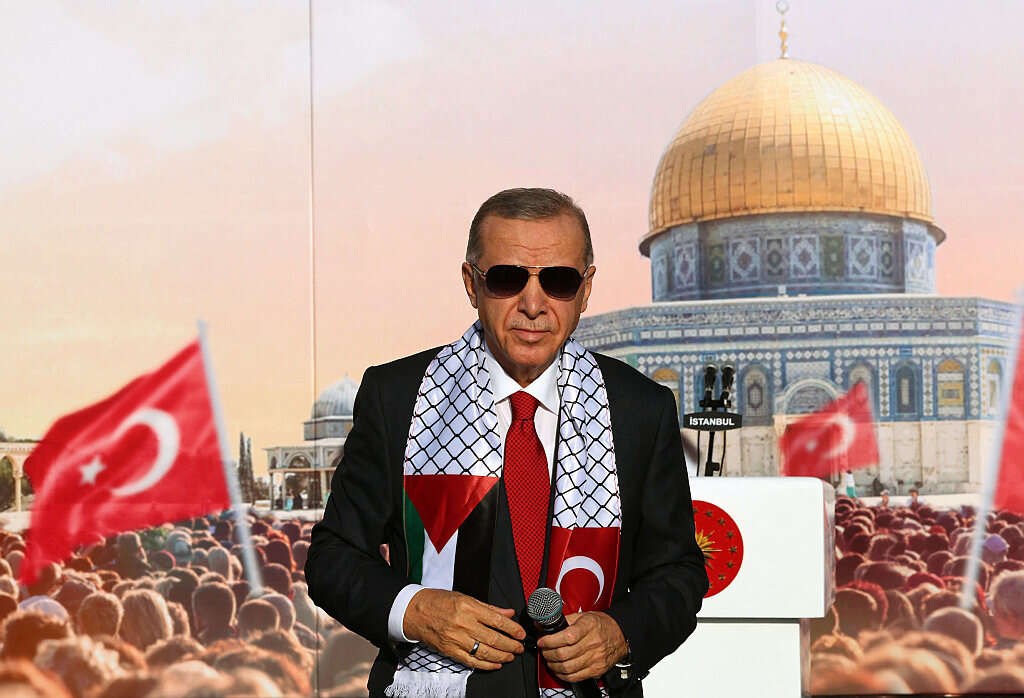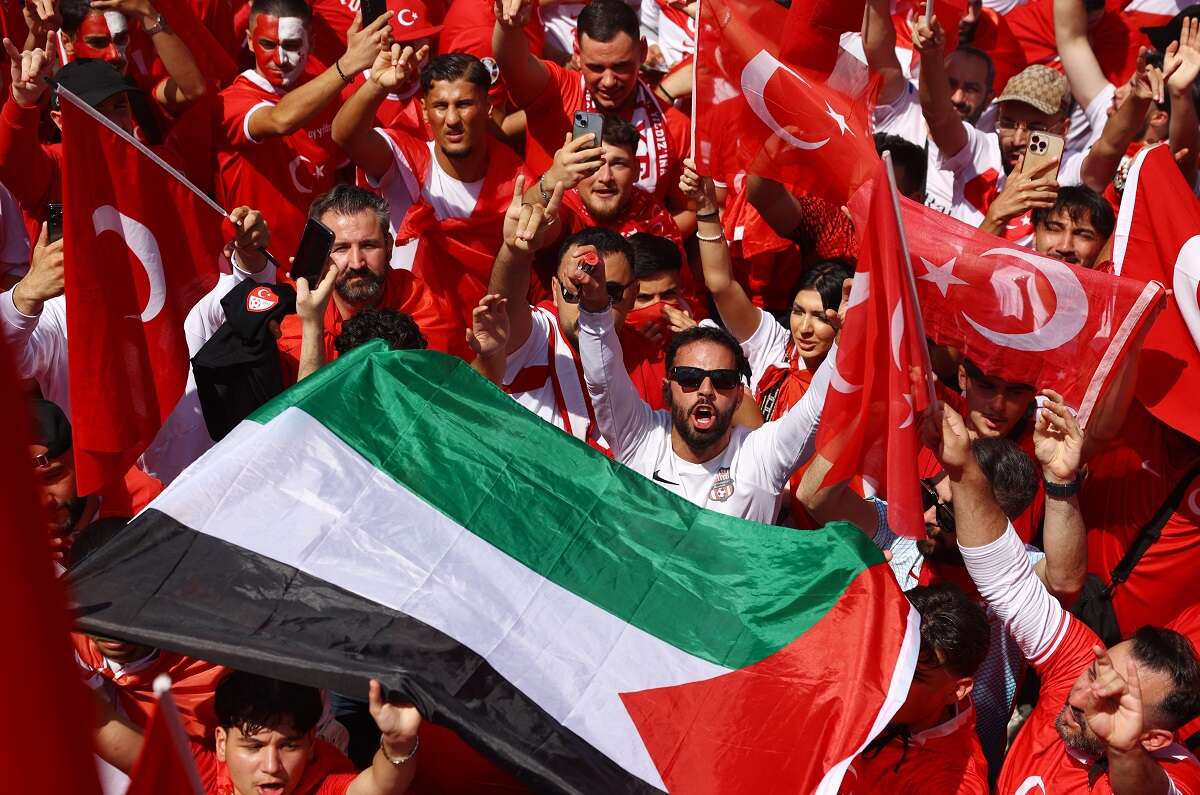"Recent events in our region, especially in Syria, remind us of an important fact: Turkey is bigger than Turkey," Turkish President Recep Tayyip Erdogan said in a speech at the Turkish Academy of Sciences on December 18, 2024.
The Turkish president's words should be read against the backdrop of the balance of terror between his country and Israel, which have long maintained a love-hate relationship, receiving a significant twist in the wake of the current war. This has intensified even further following the fall of the Assad regime and the establishment of the new government in Damascus, led by Ahmad al-Shara, who has enjoyed long-standing support from Ankara.
This is reflected, among other things, in the recommendations of the Nagel Committee, which were submitted to Prime Minister Benjamin Netanyahu last month. Although the committee was meant to examine the defense budget, its final report refers to the "Turkish threat" in razor-sharp words. "Israel may find itself facing a new threat that will emerge in Syria, which in some respects will be no less severe than the previous one," it states. "The problem will be exacerbated if the Syrian force effectively becomes a Turkish proxy, as part of Turkey's dream of restoring the Ottoman crown to its former glory. The presence of Turkish proxies, or Turkish forces, in Syria could deepen the danger of a direct Turkish-Israeli confrontation."
The last words need to be read again: The Nagel Committee warns the prime minister of a "direct Turkish-Israeli confrontation," no less, and calls on him to adopt a "completely different approach of 'zero containment'" towards Syria, which otherwise could fall like ripe fruit into the hands of Erdogan's army forces: "We must take into account that the entry of the Turkish army into Syria could lead to Syria's rearmament at a relatively high speed," the report states.
The Turkish vision awakens
The Nagel report is the exception that proves the rule: So far, the change in Israel's approach to Turkey has remained largely under the radar. The political and security establishment in Israel is not interested in irritating the Turkish giant and is careful of its honor. On the Turkish side, however, they are doing the opposite.
As if to breathe life into the bonfire of Israeli concerns, on February 4, exactly one month after the report's publication, the new Syrian president traveled to Ankara, where he met with Erdogan at the opulent presidential palace. Reports in the media surrounding the historic meeting claimed that the two leaders had already set to discuss the signing of a joint defense agreement between Turkey and Syria, including the establishment of two Turkish air bases in central Syria and the training of the Syrian army. In American English, this is called "boots on the ground."
There is also an escalating rhetoric from Turkey and its leader. "Turkey can invade Israel as it did in Karabakh and Libya," President Erdogan threatened last July, during a meeting of his Justice and Development Party. Even before that, he compared Netanyahu to Hitler, and claimed that the Israel Defense Forces are committing crimes against humanity in Gaza, for which he says the Israeli leadership should be "brought to justice." On that occasion, Erdogan, who sees himself as a regional and to some extent religious leader, called on "the entire Muslim world" to mobilize in the struggle against Israel.

Are we indeed facing a Turkish-Israeli confrontation, as the Nagel Committee suggests? Could Erdogan's warnings materialize in the foreseeable future? Turkey experts who spoke with Israel Hayom assess that in the wake of the October 7 war and what appears to be the weakening of the Shiite axis led by Iran, it is certainly possible that Israel is moving towards a new era, in which military confrontation between it and Turkey becomes a practical possibility. To this, of course, one must add the rise of the new regime in Damascus, a regime that is largely a proxy of Erdogan, which will allow Turkey to establish an overland bridge between it and Israel and to place – indirectly or directly – a military force right on its doorstep. If recent decades have been marked by the confrontation between Israel and Iran, it is not inconceivable that we are now on the brink of an Israel-Turkey war.
"The moment the Turks have the ability to reach us on foot, it's significant," says Dr. Hay Eytan Cohen Yanarocak, a Turkey expert at the Moshe Dayan Center at Tel Aviv University. "Already today, Turkey has almost unlimited access to northern Syria, and they are talking about paving roads, railways, and infrastructure throughout Syria in the future. If this happens, then one day their ability to move military forces within Syria, on a large scale, will be significant. Israel needs to do everything not to turn Turkey into an active enemy, because Turkey is not Iran. It's a stronger country, with a more sophisticated army, and a much more significant strategic location than Iran. Not someone you'd want to find yourself at war with."
"Until now, Israel and Turkey have managed to maintain a certain degree of correct relations," adds Noa Lazimi, a researcher at the Misgav Institute for National Security. "Even after the Mavi Marmara flotilla in 2010, the countries knew how to rehabilitate their relations. However, in the current war, Erdogan has intensified his attitude towards Israel, which may indicate his willingness to go further with his imperialist ideology, which also aligns with internal public opinion in Turkey. Recently, Erdogan has proven that he is willing to risk what is right for his country for the sake of extreme ideology. On the other hand, Turkey is a member of NATO and has economic and security interests vis-à-vis the US, so I don't think it would be wise for him to go all out against Israel in the short term."
Q: What about the long term?
"What happened in Syria has whetted Erdogan's appetite. From his perspective, there's an opportunity here to realize his neo-Ottoman vision. We'll have to wait and see how far Erdogan goes and whether he goes too far with his vision."
Fragile relations
Since the Mavi Marmara events, Israel has been treading carefully to rehabilitate its relationship with Turkey. The diplomatic effort began to bear fruit in 2022, culminating in a meeting between President Isaac Herzog and his Turkish counterpart in Ankara. "I hope this is a turning point," Erdogan said at the time. Shortly after, then-Prime Minister Yair Lapid also met with Erdogan on the sidelines of the UN General Assembly in New York. "And yet," says a former senior official in the defense establishment, "we have always had a very great suspicion towards Turkey."
This suspicion proved itself after the outbreak of the war. In September 2023, Netanyahu and Erdogan still managed to meet on the sidelines of the UN General Assembly, declaring that "our ties are strengthening." However, a month later the war broke out, and the "strengthening ties" ran aground: Turkey froze trade with Israel, the national airline Turkish Airlines stopped its flights to Ben Gurion Airport to the dismay of many Israelis, and Erdogan, as mentioned, compared Netanyahu to Hitler and threatened to invade Israel, so that it could no longer use its army against the Palestinians, or anyone else. "Who can guarantee that when they finish destroying Gaza, they won't turn their gaze to Antalya?" the Turkish president wondered.
All this happened while Turkey, which already holds one of the largest and strongest armies in the Middle East, is increasingly strengthening militarily. In recent years, it has become a force to be reckoned with when it comes to offensive UAVs, developed ballistic missiles with a range of 2,000 km (1242 miles) that can reach any point in Israel, and has even begun to seriously engage with the idea of establishing a nuclear program (ostensibly for civilian purposes). Meanwhile, Turkey supported Azerbaijan militarily in its war against Armenia in the Nagorno-Karabakh region, invaded Libya as part of the civil war, deepened its control in Cyprus, and effectively established a Turkish army in northern Syria, which fought against the Assad regime until its overthrow.

"Ataturk, the founder of modern Turkey, had a famous saying – 'Peace at home, peace in the world'," Lazimi says. "He aspired to avoid regional conflicts and build ties with the West. However, this perception has encountered bumps, especially since Erdogan's Justice and Development Party came to power in 2002. Initially, the party had a doctrine of zero problems with neighbors, but over time it began to adopt a much more aggressive approach of involvement in conflicts in the Middle East, which in most cases actually contributed to instability rather than the opposite. This went hand in hand with Erdogan concentrating more and more powers for himself. Erdogan is a leader with Islamist, neo-Ottoman aspirations, and he sought to brand Turkey as a military power with the aim of elevating its status to a country that can lead the Sunni Muslim world. On the ground, we see this in many arenas where the Turks are present today – Azerbaijan, Libya, Cyprus, and, of course, the deep involvement in Syria."
The moves in Syria are the cornerstone of Erdogan's expansion policy. In October 2021, Foreign Ministry officer Shlomit Sofa, "Yossi" from the Prime Minister's Office, and Colonel Uri from the IDF Intelligence Directorate published an article in the military journal "Ma'arachot" under the title "Turkey's Security Paradigm." According to them, this paradigm "has undergone substantial changes under Erdogan's rule... and it brings to expression the concept of political Islam from the school of the 'Muslim Brotherhood'."
According to them, Turkey has adopted an "active and assertive" approach based on political and military independence, and "in Turkey's view, Iran and Israel interfere with its plans and aspirations in the Syrian, Iraqi, Azerbaijani, Palestinian, and other arenas." Turkey, the article claims, is also expanding its influences within Israel, among Muslim citizens of Israel, and especially in the Jerusalem area. In this context, Turkey funds Islamic associations and provides scholarships to Muslim students.
But Turkey has concentrated most of its efforts, as mentioned, in Syria. Turkish involvement in Syria began immediately with the outbreak of the civil war in 2011, when Turkey supported the Syrian rebels financially, logistically, and militarily. Turkish army forces even conducted three military operations that received laundered names – "Euphrates Shield" in 2016, "Olive Branch" in 2018, and "Peace Spring" in 2019 – through which Turkey established itself in the strip it created in northern Syria. In this strip, one can see to this day, apart from military presence, also Turkish flags and the use of Turkish currency and language. In fact, this area is already effectively part of Turkey.
The symbiosis between Ankara and the Syrian rebels, led by the new President al-Shara, came to greater expression in recent months. Although Turkey did not actively participate in the attack led by al-Shara (who then still used the alias Abu Mohammad al-Julani), the experts we spoke with are convinced that Erdogan was involved behind the scenes, and that in any case, al-Shara would not have launched the attack without receiving a green light from him.
After the overthrow of the Assad regime, the ties between Erdogan and al-Shara became overt: The head of the Turkish spy appartus was one of the first international figures to visit Syria immediately after the completion of the revolution, and immediately after him, the Turkish foreign minister arrived at the presidential palace in Damascus, where he met with al-Shara. This meeting, by the way, was the first time al-Shara shed his military uniform and dressed in a suit and tie. "I have no doubt that the suit and tie were brought to al-Shara by Turkey, if not physically then metaphorically," says Dr. Yanarocak. "Until then, al-Shara walked around in uniform and had a stigma of a terrorist. The Turks turned him into a statesman."
According to Yanarocak, the transformation that al-Shara underwent also symbolizes the way Erdogan perceives him. "Erdogan looks at Syria as flesh of Turkey's flesh, and not as a satellite state," he explains. "Just recently, Erdogan said that 'if World War I had ended differently, we could call Idlib, Aleppo, and Damascus Turkish provinces of today.' Because of all sorts of different international values, Erdogan must ostensibly respect the official borders and therefore does not declare a full conquest of Syria. But I am convinced that from Erdogan's perspective, al-Shara is nothing more than the Ottoman governor of Syria."

The cooperation between Turkey and the new regime in Damascus is worrying, but some of the experts we spoke with suggest not to lose one's composure. "On one hand, al-Shara owes his success to Turkey," says Dr. Carmit Valensi, head of the Syria program and senior researcher at the Institute for National Security Studies. "On the other hand, it's very clear that he currently wants to disconnect, or at least reduce Syria's dependence on foreign factors. His foreign minister recently said that they would like to see less foreign presence in Syria, including Turkey. At the same time, al-Shara is also talking with the Saudis, Qataris, and in fact the whole world, including the West.
"In the last two months, we've seen a blitz of dozens of diplomatic delegations arriving in Damascus, including an American delegation. There is currently a competition for influence between the Turks, who have a very clear agenda regarding how they want to see Syria and their ability to assist in reconstruction and military means, versus the more moderate Sunni camp of Saudi Arabia and Jordan with Western and American support, who would like to see Syria moderating and moving away from the influence of the Muslim Brotherhood."
Until the situation in Syria stabilizes, Valensi recommends not rushing to declare al-Shara a Turkish puppet, as his predecessor Assad was an Iranian puppet. "Turkey is not Iran, and Erdogan is not [Iranian leader] Ali Khamenei," she says. "True, Erdogan has Ottoman aspirations, but he is a much more pragmatic player than a fundamentalist who wants to spread the Islamic revolution. I wouldn't rush to position Turkey as Israel's new enemy, there is room for dialogue and cooperation with it."




